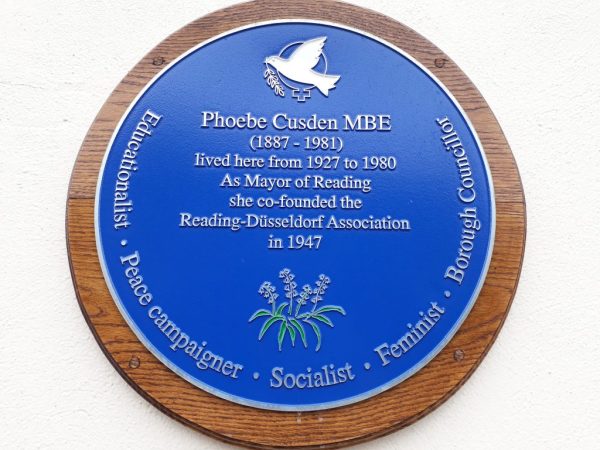Phoebe Cusden

Phoebe Cusden MBE
A blue plaque has been unveiled to honour a Reading mayor, Quaker, peace campaigner, trade unionist, writer and theatre founder. She is probably best known for her work in setting up what is now the Reading Dusseldorf Association.
The plaque at 55 Castle Street, Reading, the former home of Mrs Cusden, was unveiled by Reading Mayor Councillor Rose Williams on Sunday, November 19, 2017.
Phoebe Cusden (1887-1981) became Mayor of Reading in 1946. Her mayoral year coincided with major flooding which affected the town in 1947 when the Thames burst its banks following a period of heavy snow. Large areas of the town were submerged under several feet of water. The Mayor herself described it as ‘the town’s worst disaster in 300 years.’
Phoebe Cusden defied local opposition to launch a Christmas appeal in 1946 after a desperate plea from the Royal Berkshire Regiment. The regiment was occupying war-ravaged Dusseldorf, a city destroyed by bombing, and appealed for aid for the 56,000 residents living in ruins and cellars.
Mrs Cusden was Reading Mayor at the time and responded with a direct appeal to Reading people in the local press, saying: “The average British family will sit down to their own Christmas dinner with a lighter heart if they have helped to alleviate the tragic plight of these unfortunate children, who cannot be held responsible in any way for the guilt of the Nazi Party.”
By January 1947 and despite initial reluctance to support the former enemy, the fund had reached £93 and half a ton of food, 150 parcels and 12 sacks of clothing and shoes had been collected.
Robert Dimmick, vice-chairman of the Reading Dusseldorf Association, said: “Phoebe’s initiative grew into a strong and lasting friendship between Reading and Dusseldorf which has given great pleasure to many people. We should be proud of that and continue to develop it. I hope it (the plaque) will inspire people to become like her and care for neighbours whether they are next door or around the world.”
After the First World War, she led a march protesting against food profiteering and in 1923 stood unsuccessfully as a Labour parliamentary candidate.
She established the Reading Women’s branch of the Labour party and in 1931 became the second woman elected to Reading Council.
She was the editor of the Reading Citizen, a Labour Party newspaper for 30 years, organising secretary of the Nursery Schools Association and one of the founders of Reading’s Progress Theatre.
In 1948 she founded the short-lived Women’s Peace Movement but continued her pacifist work as international vice-president of the Women’s International League for Peace and Freedom.
In 1951 she was made an MBE (Member of the Order of the British Empire).

